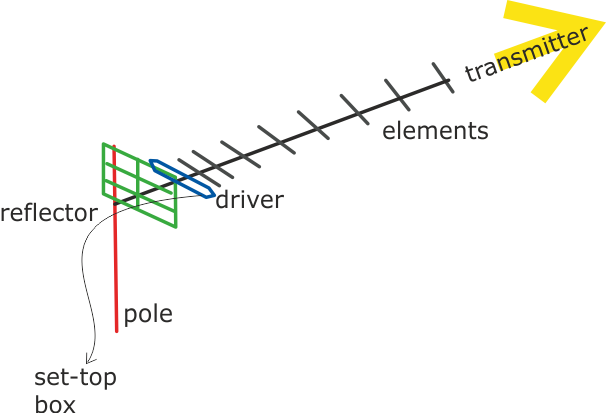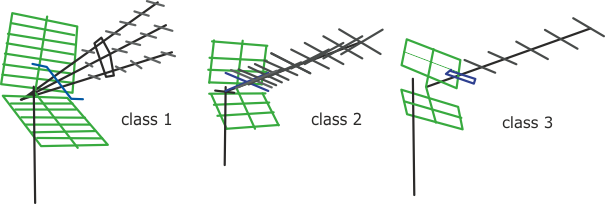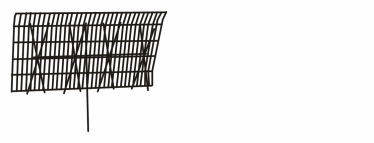Freeview reception - all about aerials
 Brian Butterworth published on UK Free TV
Brian Butterworth published on UK Free TV Updated 8th January 2014.
Your ability of receive all the Freeview transmissions depends on the suitability of aerial
- the design style,
- the "group", and
- its physical location.
Standard type - Yagi aerial

The standard type of TV aerial is known as the Yagi aerial. It is mounted on a pole, and consists of a rod with a reflector (shown green) at the back and many spiky elements (in grey) at the front. The connecting cable connects to the element nearest the reflector, known as the driver (shown in blue).
These Yagi aerials are directional and so pick up signals best from a transmitter that the rod points towards. The more elements the aerial has, the better it picks up a signal and becomes more directional.
A standard-type aerial is all that is required for digital TV reception in most places. These antennae have between 10 and 18 elements and a single reflector. These are recommended for new installations for good digital television reception, but will more often than not function perfectly in good reception areas.
Typically these aerials are designed to receive only some transmission frequencies - see "groups" below.
High Gain aerials

These aerials are designed for poor digital reception areas, and have two reflectors. For maximum signal strength, some digital high gain aerials have up to 100 elements. Since the switchover to digital-only transmissions back in October 2012, most UK households now have good quality digital TV signals.
A more expensive aerial is only required where the signal strength is low, but can often provide the whole Freeview reception where it might otherwise be impossible.
The CAI (that represents aerial installers) has four standards for digital TV aerials. The highest standard "1" is for homes on the fringes of coverage areas, intermediate standard "2" is suitable for use within the coverage area; minimum standard "3" is for good coverage conditions.
These aerials can be either wideband, or receive only selected frequencies - see "groups" below.
Grid

You may haved used a 'Grid aerial' for analogue reception, but as they are generally unsuitable for Freeview reception, they have now generally been replaced by the Yagi type. However in some places a Grid aerial installation may work for Freeview: otherwise replace with a standard Yagi aerial.
Indoor
Indoor aerials are generally not suitable for Freeview reception. In areas of good signal strength it is often possible to receive some transmissions. Even where an aerial works, people often find that may get interruptions to their viewing (or recording).Loft mounted
Loft mounted arrivals are not generally recommended for Freeview reception, as the roof tiles and plumbing will degrade the signal. Some compensation for this loss of signal can be made by using satellite-grade cable to connect the set top box to the aerial.Positioning
The best position for a TV aerial is mounted outdoors, as high from the ground as possible, pointing directly at the transmitter. The signal can be blocked by hills and tall buildings. It should be positioned away from any other aerials.Horizontal or vertical?
The transmitter will either use vertical mode which requires the elements of your aerial to be up-down, or horizontal mode which requires them to be level with the ground.Groups
Both analogue and digital television is transmitted the same group of transmission frequencies (known as channel 21 through to 60). A coloured marking on the aerial shows the group.
To create the best possible analogue picture, TV transmissions from adjacent transmitters have been designated to several different groups of frequencies. By using an aerial that receives only the channels in the correct group, the analogue picture can be kept free from interference.
To receive Freeview transmissions from the same transmitter it has been sometimes necessary to use frequencies that are not part of the transmitter's normal group. When this has occurred, the aerial will need to be replaced with a "wideband" aerial (also known as group W) - one that covers every group.
As Ofcom is planning to move the TV frequencies again - perhaps as soon as 2018 - it may be wise to use a wideband aerial if you can to ensure you can keep viewing Freeview for many years to come.
Help with Television sets?
Tuesday, 11 January 2011
Wednesday, 12 January 2011
H
Hackett12:07 PM
Newmarket
Just wanted to say how much your help is appreciated. We're not sorted yet, but unbelievably reassuring to speak to a voice of reason & have access to this forum. There's so much conflicting advice out there, we need someone to guide us through it, so a big fat thanks!
| link to this comment |
Hackett's: mapH's Freeview map terrainH's terrain plot wavesH's frequency data H's Freeview Detailed Coverage
Thursday, 13 January 2011
Hackett: Always happy to help. Please let me know how you get on.
| link to this comment |
H
Hackett4:29 PM
Newmarket
Latest is we took pvr round to parents (who live nearby & need to go down digital route too) and all working fine and dandy, so guess it must be a prob with our aerial or local reception. But, following your advice, we'll wait and see what happens after switchover in March (as telly copes ok currently) before we spend money on installing a new aerial. Fingers crossed! Thanks again, h
| link to this comment |
Hackett's: mapH's Freeview map terrainH's terrain plot wavesH's frequency data H's Freeview Detailed Coverage
Friday, 14 January 2011
Hackett: That is probably the best thing to do, little point spending hundreds of pounds for a couple of months.
Please let me know what happens then.
| link to this comment |
Saturday, 15 January 2011
A
Anwen9:09 AM
We have recently bought a new TV and freeview+ box and the channels could all be viewed clearly. But all the channels have now frozen or disappeared appart from all the BBC channels. How can this have happened and what can we do to solve the matter? Do BBC frequencies vary from other channels? Thanks
| link to this comment |
Sunday, 16 January 2011
F
Franpip9:48 AM
Hi again Briantist
firstly, thanks for the info, we had a new aerial fitted on Friday and we now get digital tv and lots of Freeview channels.
I have one further question if you don't mind. We have a Sharp Combi vhs & dvd recorder and it seems we can still only record the analogue channels. I thought I'd read that we could still use our 'old' recorder but it would only record the channel we were watching and I assumed that included the digital channels ?
| link to this comment |
J
Joanna4:52 PM
Builth Wells
I bought freeview for my parents at Xmas but they cannot get ITV3 their favourite channel!!
Postcode LD2 3NG only 0.8 mile from Builth Wells transmitter. Please help, they are driving me mad!!
| link to this comment |
Joanna's: mapJ's Freeview map terrainJ's terrain plot wavesJ's frequency data J's Freeview Detailed Coverage
K
KMJ,Derby7:36 PM
Joanna: Unfortunately both Builth Wells and Llandrindod Wells transmitters are PSB only relay sites. It is likely that due to financial constraints they will never transmit the COM muxes. If you have no signal available from a main transmitter which carries the SDN mux your only option for ITV3 will be satellite reception.
| link to this comment |
Monday, 17 January 2011
Franpip: I'm glad to hear that you have all the services.
You won't be able to use an analogue recorder with Freeview, you should consider getting a Freeview+ or Freeview+HD recorder.
You can SCART your recorder to a set-top box, but this is very inflexible.
| link to this comment |
Select more comments
Your comment please!